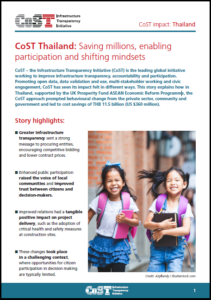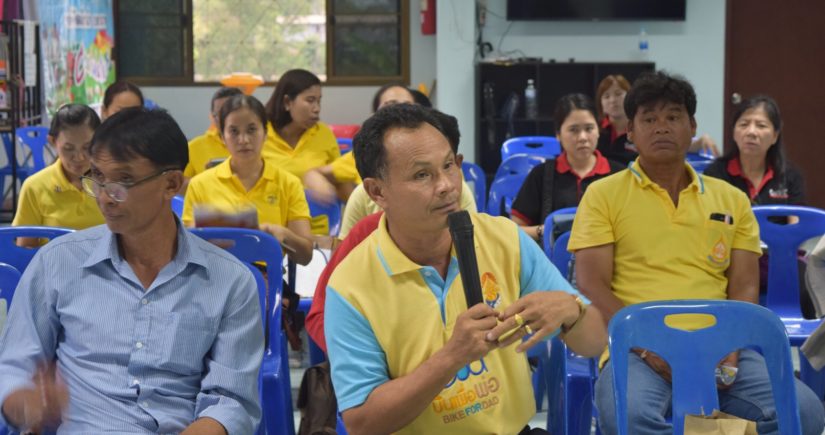Today CoST publishes its latest impact story demonstrating how in Thailand, the CoST approach prompted behavioural change from the private sector, community and government and led to cost savings of THB 11.5 billion (US $360 million) through increased transparency. By promoting open data, data validation and use, multi-stakeholder working and civic engagement, we have seen both financial benefits and better quality infrastructure projects delivered.
Deterrent effect of the CoST approach saves US $360 million
In 2019 several public statements from the Thai government highlighted significant cost savings resulting from the deterrent effect of the CoST approach. Later clarified by the Thai Ministry of Finance as US $360 million*, this saving followed heightened disclosure on infrastructure projects which, through its deterrent effect, inhibited misbehaviour in procurement, strengthened competition and led to a more efficient use of public budget.
Since 2015 CoST Thailand has been working to increase the level of data in the public domain, using the CoST Infrastructure Data Standard (CoST IDS) to do so. The increase in data published on CoST Thailand’s disclosure portal reflects the programme’s success: just two projects were published in 2015, rising to 317 in March 2020. The significant cost savings which have come as a result can now be reallocated to other critical infrastructure or public services.
Unprecedented approach to community engagement improves trust and project quality
Over the last two years CoST Thailand has been bringing together local communities and the contractors and procuring entities of projects through public gatherings. Here a safe space has been provided for communities to raise issues on both how the construction process and poor-quality infrastructure has affected their everyday lives.
This three-way dialogue is an innovative approach in Thailand and has increased trust between citizens and decision-makers. In turn, we’ve seen tangible positive impact on how projects have been carried out, from speeding up delivery to ensuring critical health and safety concerns are addressed. This had led to households gaining access to drainage systems, measures to reduce disruptive flooding and the installation of new pipes to resolve water shortages: all at the request of community members themselves.
Our work in Thailand has been made possible with support from the UNDP, the UK Prosperity Fund ASEAN Economic Reform Programme and the Thailand Ministry of Finance.
*This figure is correct as of July 2020.
